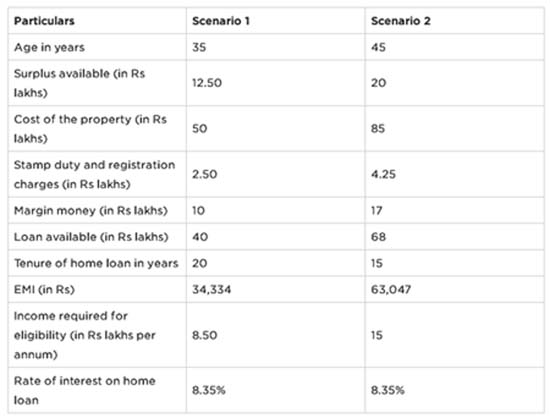How To Plan Your Finances To Buy A House in 2018
January 2018
Buying a house requires a certain amount of margin money to be paid from the buyer’s own funds. We look at how to determine the loan eligibility, the EMIs payable and ways to raise the margin money
Buying a house seems to be an important goal, not only for newly-married people, but also for people who are single and earning and are planning to marry, unlike the previous generations who would buy/construct their homes with their retirement funds. There may be many of you, who are planning to buy a house in 2018 with home loans. Let us understand how the loan eligibility amount is determined, how much money you need to contribute as your own share (margin money) when availing of a home loan and how to raise this margin money if it is not already available.
Financial planning for buying a house in 2018, with margin money available
The type of house that you can buy, will depend on two factors – the margin money or down payment that you can make and your income level. As per the Reserve Bank of India (RBI) and National Housing Bank’s directions, housing finance companies and banks are not allowed to lend beyond a certain percentage of the fair market value of the property. This percentage is called the loan to value (LTV) ratio and it depends on the amount of loan being applied for by the borrower. For a loan amount of up to Rs 30 lakhs, you can get a loan of up to 90 per cent of the value of the property. The LTV for a loan between Rs 30 lakhs and Rs 75 lakhs is 80 per cent and beyond Rs 75 lakhs, it is restricted to 75 per cent.
While granting home loans, lenders do not finance the stamp duty and registration charges. This has to be financed by the home buyer and is generally around five per cent of the cost of the property. While granting a home loan, the lenders presume around 50 per cent of one’s income, as being available for servicing the home loan. Lender also do not extend the home loan tenure beyond the age of 60 years, for salaried people. In case of professionals, the tenure can be extended up to 65 years of age.
If you already have accumulated the necessary margin money, let us look at two examples, to understand the value of the house that you will be able to buy, the home loan amount that you will need to avail of and the required annual income to avail of such home loan. The value of the house in the following examples, does not include the cost of furnishing the house.
Scenario 1: The borrower is aged 35 years and has a resource of Rs 12.50 lakhs
You should opt for a home loan tenure of 20 years, as your age at the time of payment of the last instalment would be 55 years, which is well below the 60 years of age up to which the home loan tenure can be extended.
Scenario 2: The borrower is aged 45 years and has a resource of Rs 20 lakhs
Since you have already completed 45 years of your age and presuming a retirement age of 60 years, you will get a home loan for 15 years’ tenure only.
Based on the above, the relevant details are tabulated hereunder:
Financial planning for accumulating the margin money, for buying a house
Those of you who are contemplating buying a house in near future (say, within three to five years), need to plan for accumulating the margin money. During this period, you have to accumulate the required 20 per cent of the cost of the house. Since the time period available for you is between three years to five years, it is not advisable to take the risk of investing in equity for this goal. In such a situation, you can start investing in debt schemes, through monthly SIP. Alternatively, you can start investing in debt-oriented monthly schemes of mutual funds, where around 10-15 per cent of the corpus is invested in equity, so as to give the scheme a chance to perform better, in case the equity performs better during this period.
In case your time horizon is more than five years, you can start investing through balanced funds of a good fund house. Balanced funds are basically equity-oriented funds, where a minimum of 65 per cent is invested in equity shares and the balance can be invested in debt funds. The flexibility, to shift up to 35 per cent of the debt portion, will help you reduce the volatility associated with investments in equity. This will ensure that you are able to accumulate your desired funds in the targeted period.
While planning to raise the margin money required to purchase a house in future, you need to consider the expected rise in property prices, at least equal to the average rate of inflation. Unless you factor in this price escalation in the property, you may find that the margin money accumulated by you is not enough, for the down payment on the property.
Read all Real Estate / Property Articles



